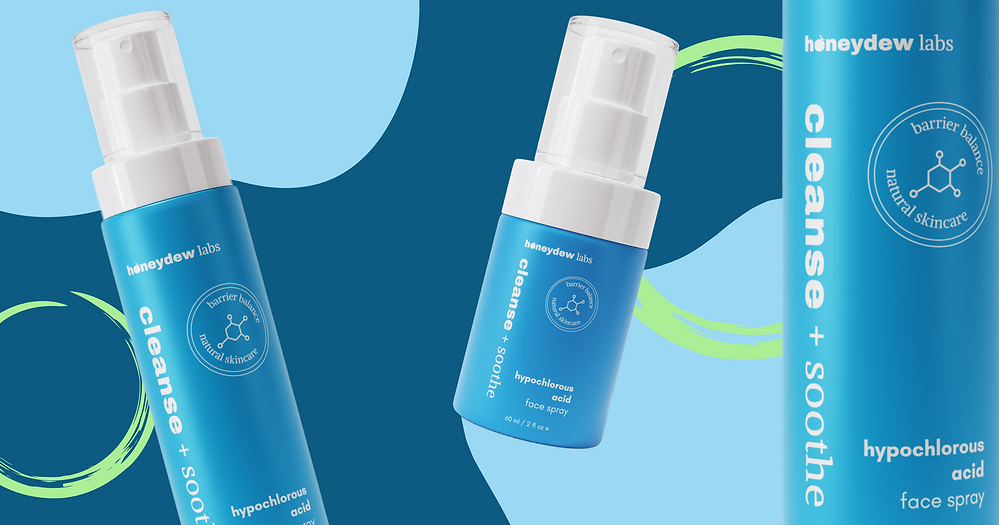
Scalp acne—yes, it’s a thing. If you’ve ever noticed those painful, tiny bumps along your hairline or hidden under your strands, you know how frustrating it can be. Unlike regular acne, which you can easily target with skincare products, scalp acne feels like a hidden battle. So, what can you do about it? Enter hypochlorous acid (HOCl)—a skincare ingredient you might not have considered for your scalp.

What Causes Scalp Acne?
Scalp acne is usually triggered by clogged hair follicles, excess oil production, bacteria buildup, or even irritation from hair products. Sweat, stress, diet, and hormones can all play a role too. If you’re a fan of dry shampoo (guilty!) or you don’t wash your hair as often as you should, buildup can trap bacteria, leading to breakouts.
How Can Hypochlorous Acid Spray Help?
Hypochlorous acid is a gentle but powerful antimicrobial that fights bacteria and reduces inflammation—two of the biggest culprits behind scalp acne. Unlike harsh acne treatments that strip your skin, HOCl is non-irritating and safe for sensitive skin, making it a solid option for soothing your scalp without causing dryness or irritation.
The Benefits of Hypochlorous Acid for Scalp Acne
-
Kills Acne-Causing Bacteria – HOCl naturally fights off P. acnes bacteria, which is responsible for breakouts.
-
Reduces Redness and Inflammation – If your scalp feels irritated and sore, HOCl can help calm things down.
-
Balances Oil Production – While it won’t completely dry out your scalp, HOCl can help keep excess oil in check.
-
Safe for Daily Use – No stinging, no harsh side effects—just a light mist that works without the drama.
How to Use Hypochlorous Acid for Scalp Acne
Using HOCl is simple. If you have a hypochlorous acid spray, just spritz it directly onto your scalp after washing your hair or whenever you feel irritation. You can also apply it before bed to let it work overnight. If you use styling products often, misting your scalp with HOCl after sweating or heavy product use can help prevent buildup that leads to breakouts.
Does It Actually Work?
A lot of people have seen an improvement in scalp irritation and those annoying little bumps by adding HOCl to their routine. It’s antibacterial and anti-inflammatory, which means it can help speed up healing and keep new breakouts from popping up. It’s not an overnight miracle, but with regular use, you might notice your scalp feeling calmer and clearer over time.
TLDR;
Scalp acne is a pain, and if you’ve been struggling to get it under control, hypochlorous acid might be worth a shot. It’s not some magic potion, but it does a solid job at reducing redness, fighting bacteria, and keeping your scalp from getting too irritated. Also, it’s super gentle, so you don’t have to worry about it making things worse, neccessarily. It is a low risk, high reward option to try if you are dealing with scalp acne!
If you want a high-quality, lab-tested HOCl spray that’s safe for your skin, wounds, and surfaces, check out our HOCL spray on Amazon Canada or Amazon USA. It’s backed by science, easy to use, and helps keep bacteria away—without harsh chemicals.
 Reading this during Valentines Day season? You might be interested in our Valentines Gift Guide for Her: in this blog here.
Reading this during Valentines Day season? You might be interested in our Valentines Gift Guide for Her: in this blog here.
DISCLAIMER: This article is for informational purposes only and should not be considered medical advice. If you think you have a serious scalp infection, see a doctor—especially if it’s swollen, painful, or spreading.
Reference:
-
Del Rosso, J.Q. (2019). "The Role of Hypochlorous Acid in Skincare and Wound Healing." Journal of Clinical and Aesthetic Dermatology.
-
Luebberding, S., et al. (2020). "Bacterial Infections in Scalp Acne: Causes and Treatments." International Journal of Dermatology.
-
Draelos, Z.D. (2021). "Safe and Effective Use of Antimicrobial Agents on the Scalp." American Journal of Dermatology.
-
Tan, J.K.L. (2018). "Managing Acne: The Importance of Non-Irritating Treatments." Dermatology Clinics.
Written by
Honeydew Labs Team















